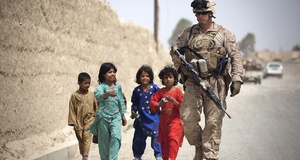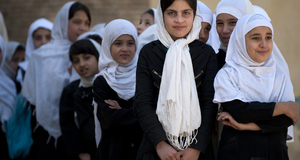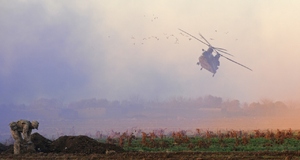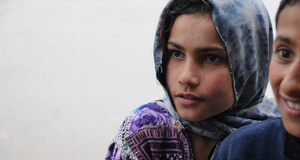Afghan Ministry of Foreign Affairs. Acting Foreign Minister meets with German Special Representative for Afghanistan and Pakistan. 17 November 2013. http://mfa.gov.af/en/news/minister-afg--2 (accessed December 15, 2013).
AFP. Aid groups vow to stay as NATO exits Afghanistan. 29 December 2013. http://au.news.yahoo.com/thewest/world/a/20525517/aid-groups-vow-to-stay-as-nato-exits-afghanistan/ (accessed December 30, 2013).
AlJazeera. Further delays for US deal with Afghanistan. 26 November 2013. http://www.aljazeera.com/news/asia/2013/11/further-delays-us-deal-with-afghanistan-201311263545983309.html (accessed November 26, 2013).
—. NATO personnel killed in Afghanistan. 27 December 2013. http://www.aljazeera.com/news/southasia/2013/12/nato-personnel-killed-afghanistan-20131227111554324104.html (accessed December 27, 2013).
BBC Productions. “Never Ending War In Afghanistan - Documentary.” Youtube. 2011. http://www.youtube.com/watch?v=mdwAN8khPE8 (accessed December 26, 2013).
Berdal, M., and D. Keen. “Violence and Economic Agendas in Civil Wars: Some Policy Implications.” Millennium: Journal of International Studies. Vol. 26 (3), 1997: 795-818.
Berghof Foundation. “From Combatants to Peacebuilders: A Case for Inclusive, Participatory and Holistic Security Transitions.” Berghof Conflict Research. 2012. http://www.berghof-conflictresearch.org/documents/publications/Policy_Paper_dudouetetal.pdf (accessed December 20, 2013).
Bright, L. Shay. “The Conflict Mapping Chart.” n.d. http://www.in-mediation.eu/wp-content/uploads/file/ConflictMapping.pdf (accessed October 31, 2013).
Brinkmann, Cornelia. “Steps for Peace: Working Manual for Peace building and Conflict Management.” German Development Service (Deutscher Entwicklungsdienst, DED). December 2006. http://www.giz.de/Entwicklungsdienst/de/downloads/ded2007-steps-for-peace-en.pdf (accessed December 15, 2013).
CIA. The World Factbook. 9 December 2013. https://www.cia.gov/library/publications/the-world-factbook/geos/af.html (accessed December 30, 2013).
Clark, Kate. “Afghanistan, the United States and the BSA: Who blinks first?” Afghanistan Analysts Network. 27 November 2013. http://www.afghanistan-analysts.org/afghanistan-the-united-states-and-the-bsa-who-blinks-first (accessed December 12, 2013).
—. “The Opening of the Taleban Office in Qatar: A propaganda coup and an angry government.” Afghanistan Analysts Network. 13 June 2013. http://www.afghanistan-analysts.org/the-opening-of-the-taleban-office-in-qatar-a-propaganda-coup-and-an-angry-government (accessed November 28, 2013).
—. “The Taleban in Qatar (2): Biographies – core and constellation.” Afghanistan Analysts Network. 24 June 2013. http://www.afghanistan-analysts.org/the-taleban-in-qatar-2-biographies-core-and-constellation-amended-with-more-details (accessed September 29, 2013).
Der Spiegel. Afghanistan-Beauftragter: Botschafter Koch ersetzt Steiner. 10 February 2012. http://www.spiegel.de/politik/deutschland/afghanistan-beauftragter-botschafter-koch-ersetzt-steiner-a-814487.html (accessed December 15, 2013).
—. Weltsicherheitsrat: Uno streicht 14 Taliban von Sanktionsliste. 16 July 2011. http://www.spiegel.de/politik/ausland/weltsicherheitsrat-uno-streicht-14-taliban-von-sanktionsliste-a-774857.html (accessed December 14, 2013).
Deutsche Welle. UN proposes removing Taliban from terror list to promote dialogue. 17 June 2011. http://www.dw.de/un-proposes-removing-taliban-from-terror-list-to-promote-dialogue/a-6550683-1 (accessed December 6, 2013).
Donohue, William A., and Paul J. Taylor. “Testing the Role Effect in Terrorist Negotiations.” International Negotiation 8, 2003: 527-547.
Dougherty, J.E., and R.L. Jr Pfaltzgraff. Contending Theories of International Relations: A Comprehensive Survey. 4th ed. New York: Longman, 1997.
Eban, Abba. “The Duty to Negotiate.” Washington Post, September 9 , 1994: op-ed page.
Economist Intelligence Unit. “Country Report: Afghanistan.” Country Reports January 2003, August 2003: 1-21.
—. “Country Report: Afghanistan.” Country Reports January 2012, January 2012: 1-24.
Fisher, Roger, and William Ury. Getting to Yes: Negotiating Agreement Without Giving In. 2nd ed. Edited by Bruce Patton. Boston, MA: Houghton Mifflin Hartcourt, 1992.
Grono, Nick. “Afghanistan's Injustice System.” Foreign Policy. 23 February 2012. http://southasia.foreignpolicy.com/posts/2012/02/01/afghanistans_injustice_system#sthash.ZMNIXgMX.dpbs (accessed December 15, 2013).
Hayes, Richard E., Stacey R. Kaminski, and Steven M. Beres. “Negotiating the Non-Negotiable: Dealing with Absolutist Terrorists.” International Negotiation 8, 2003: 451-467.
Hyde-Price, Adrian. “Redefining its security role - Germany.” In Global Responses to Terrorism - 9/11, Afghanistan and Beyond, edited by Mary Buckley and Rick Fawn, 101-112. London: Routledge, 2003.
International Crisis Group. “Talking About Talks: Toward a Political Settlement in Afghanistan.” Asia Report N° 221. 26 March 2012. http://www.crisisgroup.org/~/media/Files/asia/south-asia/afghanistan/221-talking-about-talks-toward-a-political-settlement-in-afghanistan.pdf (accessed November 15, 2013).
—. “Women and Conflict in Afghanistan.” Asia Report N° 252. 14 October 2013. http://www.crisisgroup.org/~/media/Files/asia/south-asia/afghanistan/252-women-and-conflict-in-afghanistan.pdf (accessed November 15, 2013).
Khan, Tahir. The Express Tribune with the International New York Times. 2 November 2013. http://tribune.com.pk/story/626006/talking-terms-qatar-talks-get-another-chance-after-deadlock/ (accessed December 15, 2013).
Lederach, J.-P. “Der Beitrag Dritter beim Aufbau des Friedens. Eine Perspektive des “Friedens von unten.”” In Die Wahrheit einer Absicht ist Zitat. Friedensfachdienste für den Süden und den Norden, edited by Josef Freise and Eckehardt Fricke. Idstein: Eirene International, 1997.
Maslow, Abraham. “A Theory of Human Motivation.” Psychological Review, 1943 (50): 370-396.
Mason, Simon, and Sandra Rychard. “Conflict Analysis Tools - Tip Sheet.” ISN - ETH Zurich. Edited by Swiss Agency for Development and Cooperation, SDC. December 2005. http://mercury.ethz.ch/serviceengine/Files/ISN/15416/ipublicationdocument_singledocument/55576247-d809-4bea-b22c-e8134336a642/en/CSPM+Tipp+Conflict+6.3.pdf (accessed November 30, 2013).
Metzger, Tobias. “Caught Between 'Deradicalization' and 'Disengagement': Clarifying Terms in the Discourse of Terrorism.” Student Pulse 5, no. 11 2013: 1-4.
National Geographic. “Afghan Heroin - The Lost War.” Youtube. 2008. http://www.youtube.com/watch?v=obhwoSameHg (accessed December 26, 2013).
Osman, Borhan. “Déjà Vu All Over Again: The Af-Pak roller coaster and a possible new Taleban office .” Afghanistan Analysts Network. 25 August 2013. http://www.afghanistan-analysts.org/deja-vu-all-over-again-the-af-pak-rollercoaster-and-a-possible-new-taleban-office (accessed December 10, 2013).
Osman, Borhan, and Kate Clark. “Who Played Havoc with the Qatar Talks? Five possible scenarios to explain the mess.” Afghanistan Analysts Network. 9 July 2013. http://www.afghanistan-analysts.org/who-played-havoc-with-the-qatar-talks-five-possible-scenarios-to-explain-the-mess (accessed December 10, 2013).
Pakistan Ministry of Foreign Affairs. Latest Press Releases/Speeches. 20 September 2013. http://www.mofa.gov.pk/pr-details.php?prID=1441 (accessed November 14, 2013).
Rashid, Ahmed. Descent into Chaos: The world's most unstable region and the threat to global security. London: Penguin Books, 2009.
—. Pakistan on the Brink: The future of Pakistan, Afghanistan and the West. London: Penguin Books, 2012.
—. Taliban - The Story of the Afghan Warlords. London: Pan Books, 2001.
Röminger, Jannika. Masterarbeit - Der Zivile Friedensdienst in Afghanistan – Erfahrungen und Erkenntnisse ehemaliger Friedensfachkräfte. Bonn: Philipps-Universität Marburg, 2011.
Rondeaux, Candace. “Reconsidering Reconcilitation in Afghanistan.” Foreign Policy. 3 October 2011. http://southasia.foreignpolicy.com/posts/2011/09/21/reconsidering_reconciliation_in_afghanistan (accessed November 10, 2013).
—. “The WikiLeaks: An Afghan View.” International Crisis Group. 28 July 2010. http://www.crisisgroup.org/en/multimedia/podcasts/the-wikileaks-an-afghan-view.aspx?alt_lang=es (accessed December 15, 2013).
Rose, Charlie. Always a Reckoning: The Charlie Rose Show. Transcript no. 1293, broadcast by PBS, 17 January 1995.
Ruttig, Thomas. “Flash to the Past: When the Taleban wanted UN-monitored elections .” Afghanistan Analysts Network. 25 June 2013. http://www.afghanistan-analysts.org/flash-to-the-past-when-the-taleban-wanted-un-monitored-elections (accessed November 30, 2013).
Sandole , Dennis J.D. A Comprehensive Mapping of Conflict and Conflict Resolution: A Three Pillar Approach. 1998. http://www.gmu.edu/programs/icar/pcs/sandole.htm (accessed December 22, 2013).
Sedra, Mark. “Challenging the Warlord Culture: Security Sector Reform in Post-Taliban Afghanistan.” BICC - Bonn International Center for Conversion. October 2002. http://www.bicc.de/publications/publicationpage/publication/challenging-the-warlord-culture-security-sector-reform-in-post-taliban-afghanistan-190/ (accessed November 29, 2013).
Spector, Bertram I. “Negotiating with Villains Revisited: Research Note.” International Negotiation 8, 2003: 613-621.
U.S. Department of Homeland Security. National Consortium for the Study of Terrorism and Responses to Terrorism (START). 2013. http://www.start.umd.edu/start/data_collections/tops/terrorist_organization_profile.asp?id=4279 (accessed November 25, 2013).
UN. “Map of Afghanistan.” UN Cartographic Dept. June 2011. http://www.un.org/Depts/Cartographic/map/profile/afghanis.pdf (accessed November 24, 2013).
United States Institute of Peace. Certificate Course in Conflict Analysis. 2004. http://online.usip.org/analysis/5_1_1.php (accessed December 10, 2013).
Wilmot, William W., and Joyce L. Hocker. Interpersonal Conflict. 6th ed. New York, NY: McGraw-Hill, 2001.
Yabi, Gilles. “The Role of ECOWAS in Managing Political Crisis and Conflict.” Friedrich Ebert Stiftung. September 2010. http://library.fes.de/pdf-files/bueros/nigeria/07448.pdf (accessed August 20, 2013).
Zartman, William I. “Negotiating with Terrorists.” International Negotiation 8, 2003: 443-450.
—. “The Timing of Peace Initiatives: Hurting Stalemates and Ripe Moments.” The Global Review of Ethnopolitics, September, Vol. 1, No. 1 2001: 8-18.
Endnotes
1.) Afghanistan spans 652,230 km² and has 29.8m inhabitants (2011). It is divided into 34 provinces (velayat) each having one governor and 329 districts (woluswali). Its biggest cities are Kabul (2.4m (outskirts 4.9)), Kandahar (362,000), Herat (355,000), Mazar-e-Scharif (290,000), Jalalabad (156,000) and Kunduz (113,000). In 2010, the country’s GDP was at $15.61b and expected to grow given the expected doubling of the mining sector between 2016 and 2024 (copper, iron ore, marble); for more information see: (CIA 2013) and (Economist Intelligence Unit 2012, 24)
2.) The Harvard Approach teaches us to focus not on positions (what actors say they want) but on interests (why they want what they say they want). Cf. (Fisher and Ury 1992)
3.) Cf. (Sedra 2002, 6)
4.) Terrorism is defined by the UN Security Council “as violent or criminal acts designed to create a state of terror in the general public” (UNSCr 1373) and by the U.S. Government “as premeditated, politically motivated violence perpetrated against noncombatant targets by subnational groups or clandestine agents, usually intended to influence an audience.” (Department of State, 2002) as quoted in (Zartman 2003, 444).
5.) Cf. (Berghof Foundation 2012, 1)
6.) Cf. (Wilmot and Hocker 2001, 177-179)
7.) Cf. (Sandole 1998)
8.) Cf. (Bright n.d.)
9.) Cf. (Bright n.d., 2)
10.) Bright enlists soft factors such as interpersonal linkages, communication skills, expertise and hard factors including control over any kind of material, natural or military resources. (Bright n.d., 2)
11.) Cf. (United States Institute of Peace 2004)
12.) Cf. (Rondeaux, Reconsidering Reconcilitation in Afghanistan 2011)
13.) Cf. (International Crisis Group 2012, ii)
14.) Cf. (International Crisis Group 2012, 2)
15.) Cf. (International Crisis Group 2012, 3)
16.) Cf. (Rashid 2009, chapter 7)
17.) Cf. (Sedra 2002, 6)
18.) Ismael Khan was held prisoner by the Taliban for two years in the late 1990s making him persecute many Pashtuns living in his Western provinces. Cf. (Rashid 2009, 126)
19.) Cf. (Rashid 2009, 125-126)
20.) (United States Institute of Peace 2004)
21.) Cf. (Rondeaux 2010)
22.) Cf. (BBC Productions 2011) describing Quetta, Pakistan as the “centre of the Taliban and other jihadi groups.”
23.) Cf. (National Geographic 2008)
24.) Cf. (Rashid 2009, 128)
25.) Cf. (International Crisis Group 2012, 3, 16): ICG instead envisions the UN to be in the lead of a broad-scale mediation process.
26.) Cf. (Wilmot and Hocker 2001, 177)
27.) India has previously signed a strategic partnership agreement (SPA) to train and equip the Afghan National Security Force (ANSF) and aims to reduce Pakistan’s influence through its memorandum of understanding (MoU) with Afghanistan and Iran discussing non-Pakistani access to ports. Cf. (Economist Intelligence Unit 2012, 15)
28.) The EU signed a partnership act with Afghanistan centred around counter-terrorism, anti-drugs and development on 14 November 2011. Cf. (Economist Intelligence Unit 2012, 16)
29.) Cf. (Bright n.d., 3)
30.) U.S. Ambassador to Afghanistan Eikenberry laments this missed opportunity of excluding the Taliban from the political process and treating Al-Qaeda and the Taliban indiscriminately. Cf. (BBC Productions 2011)
31.) Pakistan’s former President Musharraf in (BBC Productions 2011)
32.) Cf. (Wilmot and Hocker 2001, 90-92): “Currencies [of power] are valued resources or assets that if unequal in distribution contribute to conflict. Power currencies can consist of interpersonal linkages, resource control, communication skills, or expertise.”
33.) The Institute for Conflict Analysis and Resolution is a department of the George Mason University outside of Washington D.C.: www.gmu.edu/departments/icar.
34.) Cf. (Bright n.d., 2)
35.) Cf. (Rashid 2001, 8-12)
36.) Cf. (Rashid 2001, xiii-xiv)
37.) See section 2.6 and Appendix D for further details.
38.) Own graph based on (Rashid 2001, 1-20)
39.) Cf. (Rashid 2001, 74): The Taliban killed an estimated 5,000 to 6,000 according to the UN after taking Mazar in ‘98.
40.) Cf. (BBC Productions 2011) and cf. (Clark, Afghanistan, the United States and the BSA: Who blinks first? 2013) quoting Karzai: “Giving bases to the USA from a logical and emotional perspective is not an easy and cheap thing. It is very hard. I swear to God that our honour (gheirat) does not accept that. But we have no other option because of our situation 30 years ago and due to all sorts of foreigners' conspiracies…”
41.) Cf. (Rashid 2001, 18). The U.S. is said to have channelled $4-5 billion to the mujahidin between 1980 and 1992 with Saudi Arabia matching all funds leading to over $10 billion in military assistance.
42.) Rashid describes the many Taliban leaders sustaining serious eye and limb injuries from the fighting; cf. (Rashid 2001, 17-18)
43.) Cf. (Rashid 2001, 21)
44.) Please consult Appendix A for a map of Afghanistan.
45.) Cf. (National Geographic 2008)
46.) In 2007 some 2,000 km² were cultivated with opium poppies in Afghanistan supplying 90% of the world market and producing 30% more than the global demand that year. Cf. (National Geographic 2008)
47.) (Bright n.d., 4)
48.) The Loya Jirga is the traditional instrument choosing a King or deciding to go to war which consists of 2,500 tribal elders and leaders across Afghanistan. The first in 1747 founded the modern state of Afghanistan and the last pre-Taliban one was held in 1977. The Taliban considering it anti-Islamic refused to hold Loya Jirgas. An emergency Loya Jirga on 10 June 2002 represented 1,575 delegates including 200 women and elected President Karzai with 1,295 votes. Cf. (Rashid 2009, 138-140) and (Sedra 2002, 7-8)
49.) The President as head of state and leader of the government is elected for five years and appoints the government which reflects all ethnicities. Following a 2004 law, the parliament (National Assembly) consists of 249 members in the lower house (Wolesi Jirga) and 102 in the upper house (Mushrano Jirga). Cf. (Economist Intelligence Unit 2012, 5)
50.) Cf. (Economist Intelligence Unit 2003, 4-5)
51.) Cf. (Rashid 2012, 83-86)
52.) Cf. (Bright n.d., 3): 1) Individual, 2) Societal, 3) International, 4) Global/environmental level. The fourth level is excluded from the analysis since none of the actors position themselves towards ecological, but rather social, political and economic, issues.
53.) One early instance being the “Great Game” in the late 18th and 19th century between Russia and Britain over Afghanistan as a buffer state between Russia and British-India; Cf. (Rashid 2001, 11)
54.) Cf. (Rashid 2009, 133): Human Rights Watch coined the term “U.S. warlord strategy” used to “be relieved of Afghanistan's security and political and human rights responsibilities". Senator Joe Biden acknowledged this in a 2002 speech, cf. Full text of Biden's speech reported in "Biden Promises $130 Million for Security in Afghanistan"
Los Angeles Times, May 17, 2002
55.) Cf. (BBC Productions 2011)
56.) The UK launched such a governance mission in Helmand in 2006, but was quickly drawn into military engagements e.g. fighting against opposing drug trafficking gangs in Sangin. Cf. (BBC Productions 2011)
57.) Cf. (Rashid 2009, chapter 7)
58.) UNODC found that only 10% of opium production was targeted by government plantation eradication teams while most warlords were able to evade persecution in return for financial or other favours. Cf. (National Geographic 2008)
59.) Cf. (Rashid 2001, 9-10)
60.) (Berdal and Keen 1997, 798-799)
61.) (BBC Productions 2011)
62.) Cf. (Der Spiegel 2011)
63.) Cf. (Bright n.d., 4)
64.) Such tools include Moore’s “Circle of Conflict,” “Basic Human Needs,” “Three-Tiered Paradigm,” “Situation-Attitude-Behaviour,” “Diametric Formats,” “Decoding Communication” or “Determining Levels.” Cf. (Bright n.d., 6-9)
65.) Cf. (Grono 2012)
66.) Own figure based on (Bright n.d., 6-7)
67.) Cf. (Bright n.d., 7)
68.) Cf. (AlJazeera, Further delays for US deal with Afghanistan 2013) which quotes National Security Advisor Susan Rice as saying: "Without a prompt signature, the US would have no choice but to initiate planning for a post-2014 future in which there would be no US or NATO troop presence in Afghanistan".
69.) Any attempt at changing the constitution and running for a third term might have disastrous results as seen in West Africa during similar attempts e.g. by President Tandja in Niger leading to a military coup in 2010. Cf. (Yabi 2010, 12)
70.) (Sedra 2002)
71.) Cf. (Maslow 1943 (50))
72.) Own figure based on (Maslow 1943 (50))
73.) (Bright n.d., 9)
74.) Own figure based on (Bright n.d., 9)
75.) “The other three styles [except avoiding and competing] are less severe and emphasize a willingness to work with the other conflict party to achieve a solution.,” (Bright n.d., 10)
76.) For a detailed analysis of the controversial terms ‘deradicalisation’ and ‘disengagement’, please see (Metzger 2013)
77.) Cf. (Economist Intelligence Unit 2012, 9)
78.) Cf. (Economist Intelligence Unit 2012, 9-10) and (International Crisis Group 2012, 3)
79.) Cf. (Sedra 2002, 30, 33, 87): Defence Minister Fahim drafted 90 out of 100 generals from Panjshiri Tajiks and citizens from Taliban-dominated areas are almost entirely unrepresented in the military and police (while constituting 17% of the population only 1.5% of soldiers since 2009 are from these areas).
80.) Cf. (International Crisis Group 2012, 2)
81.) Cf. (Rondeaux 2011)
82.) The Pakistani Ministry of Foreign Affairs announced the release on its website in mid-September: “In order to further facilitate the Afghan reconciliation process, the detained Taliban leader, Mullah Abdul Ghani Baradar, would be released tomorrow.,” cf. (Pakistan Ministry of Foreign Affairs 2013)
83.) Cf. (Bright n.d., 10): “Competition is characterized by the use of power or violence to change the status quo or achieve a win-lose situation.”
84.) Cf. (Clark 2013)
85.) Cf. (Khan 2013)
86.) Cf. (AlJazeera 2013)
87.) Cf. (Bright n.d., 10-11)
88.) Cf. (Dougherty and Pfaltzgraff 1997, 282) as referenced in (Bright n.d., 11)
89.) For a discussion of ‘terrorist’ categories including ‘absolute’ (‘revolutionary’ and ‘conditional’), ‘contingent’ (e.g. barricaders, kidnappers or hijackers) and ‘social revolutionary or religious terrorists’, please refer to: (Hayes, Kaminski and Beres 2003), (Donohue and Taylor 2003),(Spector 2003) or (Zartman 2003, 445-447).
90.) (Zartman 2003, 443)
91.) (Zartman 2003, 447)
92.) Cf. (Clark, The Taleban in Qatar (2): Biographies – core and constellation 2013)
93.) Cf. (U.S. Department of Homeland Security 2013): Only the Pakistani Tehrik-e-Taliban (TTP) is included.
94.) Cf. (Deutsche Welle 2011)
95.) Cf. (United States Institute of Peace 2004)
96.) Ripeness can be evaluated using various approaches including MHS, MEO, Entrapment, Readiness, and Leadership. For more details, please see(Zartman 2001)
97.) (Fisher and Ury 1992) as quoted in (Spector 2003, 613-4)
98.) Cf. (Spector 2003, 613); Jimmy Carter as quoted in (Rose 1995); Cf. ‘The Duty to Negotiate’ (Eban 1994)
99.) (Hayes, Kaminski and Beres 2003, 452)
100.) Cf. (Mason and Rychard 2005, 6-7)
101.) Cf. (Röminger 2011, 23)
102.) The Taliban delegation including current Qatar office negotiator Stanakzai offered to talk with President Rabbani and Hekmatyar “if they are honest with the other factions” and suggested for violence to stop and freely select a new leadership under UN supervision which it would not take part in being “a movement and not a party that wants to participate in the elections.” (Ruttig 2013)
103.) Cf. (Rashid 2001, 64)
104.) Cf. (Khan 2013)
105.) In a 17 November 2013 meeting the issues discussed ranged from the convening of the Consultative Loya Jirga on the BSA to preparations for the 2014 presidential and provincial council elections. Cf.(Afghan Ministry of Foreign Affairs 2013) and cf. (Der Spiegel 2012)
106.) German Chancellor Gerhard Schröder as quoted in (Hyde-Price 2003)
107.) Both International Crisis Group as well as the Afghanistan Analysts Network envision a strategy of either a UN appointed envoy or a UN mediation team with broad support in the international community and the region itself to broker a peace deal between the Taliban and other ‘insurgent’ groups and the Afghan Government. Cf. (Osman and Clark 2013) and cf. (International Crisis Group 2012)
108.) Cf. (Sedra 2002, 32-33)
109.) Cf. (Brinkmann 2006, 60-61): Brinkmann emphasizes that the aim of dialogue is understanding, not agreement. Facilitation of dialogue can include: 1) Assisting the process of communication, 2) Helping participants identify their own objectives, 3) Assisting participants to agree on ground rules, 4) Encourage active listening e.g. by reframing
110.) Afghanistan Analysts Network suggests that the “Doha office was a product of secret talks between Taleban and US representatives that since spring 2010 have been facilitated by Germany “. (Osman 2013)
111.) (Brinkmann 2006, 50)
112.) Cf. (Spector 2003, 618)
113.) Cf. (Berghof Foundation 2012, 2-3): The Berghof Foundation calls for actors to pay specific attention to three dimensions “in contexts of polarised societies ... emerging from, protracted violent conflicts”: 1) inclusivity of all conflict stakeholders with the capacity to promote or impede constructive social change, 2) participation on ‘how to engage’ these stakeholders, 3) comprehensiveness (e.g. embedding DDR and SSR approaches in their economic, political and social context).
114.) Cf. (Zartman 2001, 14)
115.) Cf. (Brinkmann 2006, 58-59): These confidence-building measures have to be further broken down to cover:
1) Level of intervention, 2) Target groups, 3) Change which is hoped for, 4) Challenges, 5) Self-perceptions of Germany as a mediator, 6) Advantages, 7) Risks, 8) Starting points,
116.) (Spector 2003, 617)
117.) Cf. (Röminger 2011, chapter 4)
118.) Cf. (Lederach 1997, 46)
119.) Cf. (Brinkmann 2006, 61): Influence can be exercised by reframing and repeating the parties’ common positions or by asking them to express their own feelings and possible feelings of the other party.
120.) For a thorough analysis of women rights during the Taliban reign and in post-Taliban Afghanistan, please refer to (International Crisis Group, Women and Conflict in Afghanistan 2013).
121.) Cf. (AFP 2013): In 2013 alone, more than 30 employees were killed across Afghanistan making it the deadliest year for aid workers.
122.) Cf. Crisis Group interviews, former Taliban officials, Kabul, March-August 2011 as quoted in (International Crisis Group 2012, 4)
123.) Cf. (BBC Productions 2011): Osama bin Laden’s son stated that it was his father’s dream for the U.S. to invade Afghanistan and be defeated by guerrilla fighting as a consequence of 9/11, which is why an al-Qaeda suicide bomber killed Ahmad Shah Massoud, leader of the Northern Alliance, one day prior.
124.) (UN 2011)
125.) Own figure based on (International Crisis Group 2012)
126.) Cf. (Bright n.d., 5)
127.) (International Crisis Group 2012, 3)
128.) Own figure based on (International Crisis Group 2012, 5-9)



















